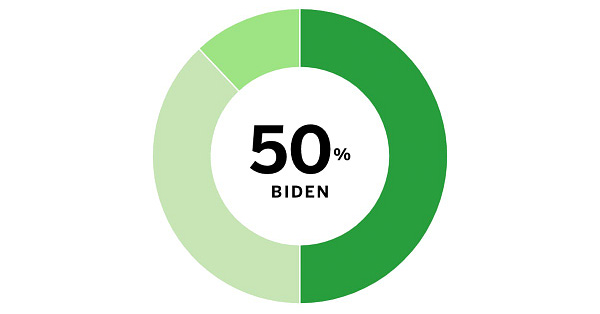How Donald Trump will win (and how he'll lose).
Plus, Mitt Romney's secret Twitter account exposed.
Today’s read: 9 minutes.
How Trump will win (or lose) in 2020, what happens to campaign dollars when a candidate drops out, and a big story in Florida.

Photo: DoD / U.S. Air Force Staff Sgt. Marianique Santos
What’s this?
Tangle is an independent, ad-free, non-partisan politics newsletter sent every Monday through Thursday around lunchtime (EST). You can read what people think about it by clicking here. And subscribe below.
What D.C. is talking about.
How Trump could beat all the noise and come out on top. After a damning press conference by Trump’s chief of staff Mick Mulvaney on Thursday (more on that below), the impeachment rattling reached his highest point yet. Reporters were stunned that Mulvaney “admitted the quid pro quo” of Trump’s dealings with Ukraine. Trump announced he’d host the G-7 summit at his Miami-Doral resort, an obvious ethical blunder, only to make a rare course reversal and announce he’d find a new location after the backlash. Republicans have been openly criticizing him more than at any point during his term, and if they aren’t criticizing him — their silence is saying a lot. His allies in the media, Senate and the House seem to be shrinking or staying steady, but certainly not growing. And the last few weeks have a lot of people asking: Can he escape impeachment? And if he does, is there any way he could win in 2020?
What Democrats are saying.
This can’t go on. The number one argument Democrats have always had against Trump is that he is unfit. On Thursday, that fitness for office came into question again. In a bizarre and “mindblowing” news conference, as the New York Times Maggie Haberman put it, Trump’s chief of staff Mick Mulvaney went from announcing that the G-7 summit would be held at one of Trump’s resorts to proudly boasting that the Trump administration allows domestic politics to influence its foreign policy. You can watch the crucial exchange here:


In the days prior, U.S. diplomats testified that Rudy Giuliani was basically running Ukrainian-related foreign policy, all while being paid hundreds of thousands of dollars by Ukrainian businessmen. In Syria, where Trump made the disastrous decision to hastily pull out U.S. forces, our once-loyal allies were being killed and displaced by Turkish forces. Turkey’s president was throwing out letters from Trump and ignoring Trump’s commands to stand down, proof of our fading world influence (As Mitt Romney, a Republican, said: “Are we so weak and inept diplomatically that Turkey forced the hand of the United States? Turkey?”)
The Washington Post ran a story on Friday titled “Growing number of Republicans struggle to defend Trump on G-7 choice, Ukraine and Syria.” The paper cited 20 GOP lawmakers and Congressional aides who were repulsed by Trump’s decision to host the G-7 summit at a Trump property and “incensed” by Mulvaney’s press conference. “Others expressed anger over the president’s abandonment of Kurdish allies in Syria.” One House Republican, Francis Rooney of Florida, said he was even considering voting to impeach the president.
All of this is a break from the last few years, and the polls are just as exciting for Democrats. 49 percent of voters are in favor of impeachment, according to FiveThirtyEight, compared to just 42 percent who disapprove. Trump’s approval rating is at just 42 percent (though it’s been remarkably steady since his term began). What gets Democrats most excited is that Trump is underwater against Biden in crucial swing states like Michigan, and trailing Warren and Sanders there as well. Democrats are trying to hammer the rising costs of health care and how the trade war has hurt the manufacturing and farming industry. If Trump is going to lose, it’ll be the rust belt — and perhaps an epic collapse in a state like Texas — that really gets him.




What Republicans are saying.
Enough Republicans are retreating from Trump that it’s worth noting. There was a spike in support for an impeachment inquiry across some polls after the Ukraine story broke. Mitt Romney has leveled his harshest criticism of Trump yet in the last few weeks, and House Republicans like Justin Amash and Rooney are clearly exhausted by defending Trump. But Trump’s path to victory lies in the simplicity of his message. While Democrats try to parse the causes of rising health care costs or transcripts of the Ukraine call, Trump and his allies in the media are sticking to a few simple messages: the economy is doing great, immigrants are bad and Democrats will do anything to remove Trump from office.
Take the segment below from Jesse Waters, which millions of conservative viewers saw on Fox News. It highlights the way median income has risen under Trump and the falling unemployment rates. It’s a convincing story to tell:
The segment was tied closely to a Moody’s Analytics report that was covered widely by the press late last week. In it, Moody’s — which has successfully called all but one presidential race (2016) since 1980, fleshed out three models where Donald Trump won in each. Moody’s message was simple: if the economy holds up, Trump will win 2020 handily — and maybe even in landslide fashion.
There are plenty of other reasons to think Trump will survive impeachment and win in 2020, too. The number one reason is the federal judges Trump has appointed, perhaps the most consequential part of his presidency. He’s now appointed 109 district court judges, 43 circuit judges, and two Supreme Court justices. As Sahil Kapur noted on Twitter, most of those judges are in their 40s or 50s, serving out life terms. For conservatives interested in blocking the progressive agenda at the state and federal level over the next fifty years, few things mean more to them than these numbers. Another four years of Trump appointees would be a boon for conservatives.
Then there’s abortion, immigration, and guns. Democrats have touched the third rail on abortion a few times, giving Republicans ammunition to accuse them of supporting infanticide. Even if it’s disingenuous, the ads will be effective in religious parts of the country. POTUS also now has new stretches of border wall in San Diego that are bringing down crossing numbers, according to border officials on the ground. That’ll give the “build the wall” crowd plenty of reason to believe the president is fulfilling a promise that has looked empty for most of his term. Then, of course, there are guns. From Beto’s “you’re damn right we’re going to take your AR-15” quote to Elizabeth Warren saying “this is not one-and-done” about banning certain guns, Republicans can tell their constituents they’re the only ones who will keep the government off their weapons. Even in 2019, that’s going to be an effective message for most of the Republican base.
The New York Times ran a story this weekend about the Trump administration’s digital advertising efforts on social media and how Democrats are struggling to keep up. Democrats on the ground in Minnesota say Trump is successfully on his way to flipping the perennially blue state, even if he’s still trailing in the polls. Florida has basically been written off by Democrats. Even if Trump struggles for approval in some states he won in 2016, his commitment to preventing gun reform, allowing states to restrict abortion and pushing stricter immigration laws could help him hold down moderates and conservatives — even the ones who loathe him — in red-leaning states.
As for impeachment, it’s a numbers game. Right now, the number is 67: that’s how many Senate votes it’d take to remove Trump from office, and frankly it’s the only number that matters. There’s good reason to think House Majority Leader Nancy Pelosi doesn’t even have the votes to impeach the president, but even if she did there’d have to be 19 Republicans in the Senate who would “flip” on Trump, assuming all 48 Democrats voted to remove him from office. Republicans would rate the odds of that, today, as extremely unlikely.
My take.
“Will Trump win again?” or “Will Trump be impeached?” are probably two questions I receive the most. I usually tell people that anyone who says they know what is going to happen in the 2020 election is selling you snake oil. There are too many variables, and it’s far too close in the polls, and we’re way too far away from the election to say with any certainty. As I’m keen on reminding folks: Trump essentially won the election with some 77,000 votes across Michigan, Pennsylvania and Wisconsin, which swung the electoral college in his favor. POTUS essentially hit a straight flush in the places he needed to, in an election against a candidate a lot of people were not enthusiastic about that saw much lower turnout from minorities than Barack Obama did in the 2012 election.
If Democrats want to win, I’ve generally adopted the attitude they should give up on trying to swing Trump voters who — if they haven’t moved yet — are unlikely to move before November of 2020. As national polls consistently show, the left-wing base is simply larger than the right-wing base, and if Democrats can ratchet up turnout they’ll win where it matters. If like in 2016, turnout falls short, they’ll lose again — and perhaps badly.


As for impeachment, I still think it’s a pipe dream. If you want to hear what voting for the impeachment inquiry was like for Democrats in purple districts, I suggest you go listen to this episode of The Daily. Believe it or not, there are quite a few Democrats currently serving in districts with lots of Trump voters, many of whom voted for both Trump and those Democrats in 2016 or 2018. Nancy Pelosi knows this, which is why she’s slow-walked impeachment despite there being overwhelming support for it amongst the liberal base. In my cynicism, I’m confident that if blue dog Democrats in the House are worried about throwing support behind impeachment now, there’s no way enough Republican Senators are going to jump ship before 2020 to remove Trump from office. Pelosi very well may whip the votes to formally impeach Trump, but I still struggle to see a world — unless the polls change dramatically — where Republican Senators actually remove him from office. Even Republicans who are critical of Trump are have been politically neutered or opted to retire. Arizona Sen. Jeff Flake and Tennessee Sen. Bob Corker both retired after taking anti-Trump positions. 16 House Republicans have already announced they’re going to retire in 2020. That doesn’t include Rep. Francis Mooney, who excited Democrats by not ruling out impeachment, only for reports to surface that he was going to retire in 2020. So far, no Republicans facing re-election have really stood up to Trump, and the only one taking a hard tact against him is Mitt Romney, who enjoys plenty of job security in Utah.
Until any of that changes, Democrats will have to beat Trump in an election if they want him out of office.






Your questions, answered.
Reminder: Tangle is about answering reader questions from all over the country. No question is too simple or complex — I want to hear what regular Americans are interested in. You can write in with your question by simply responding to this email.
Q: I'll admit, I geek out on these debates and in-party clashes before primaries. But I have to wonder, how much money are those like Beto, Castro, and Gabbard (and Yang and Steyer, but I get that their financial situation is different) just wasting by staying in a race where they have little to no chance? Are they sticking it out for visibility for potential future positions (say, in a cabinet?) I just cringe thinking about all the money in politics and how much more it could do if spent elsewhere.
- Megan, Pittsburgh, PA
Tangle: This is a really important question, especially heading into a 2020 election where there will be plenty of Senate and House races that the Democrats could use strong candidates in.
To your first point, there are interesting laws regulating what candidates can do with their campaign money. It may come as no surprise, but it’s illegal for candidates to use the money on any “personal” expenses. For example, Beto O’Rourke isn’t going to be able to pay down his mortgage with the $3.3 million of cash he has on hand. In theory, these laws prevent candidates from ever turning that money into personal gain. In practice, things are a bit murkier. One Tampa Bay Times investigation found a slew of politicians who were dropping campaign dimes on fancy dinners, to pay their daughters a “salary” or to send the money into their own consulting companies all long after their campaigns for federal office had ended.

Screenshot: ABC News image of the Democratic candidates.
As the Democratic candidates drop out, they’ll have a few options for what to do with their money. They can refund it to donors, pass it on to political allies, donate the money to charity or pay off overdue expenses from the campaign to make a clean break with their candidacy.
There’s also another, relevant option to the second part of your question: they can hold onto the money and use it to run for a different federal office. John Hickenlooper, who was in the Democratic presidential race and made moderate proposals the anchor of his appeal, dropped out and jumped into Colorado’s Senate race. As a result, several Democratic candidates in the Colorado Senate race immediately dropped out. Hickenlooper had raised $1.1 million in the second quarter of fundraising before dropping out in August. While the campaign was spending nearly that much, he got to transfer whatever was leftover into the Senate race. And, to your point, he got some free media through debates and interviews to raise his profile. His reward? He’s now polling 11 points ahead of Cory Gardner, the Republican Senator he’ll be running against in 2020. It’s impossible to tell how those numbers were impacted by his presidential race, but a little common sense makes me think the race didn’t hurt.
As for Beto, Castro, Yang, Gabbard and Steyer, the candidates you asked about, it’s tough to say. Members of the House have to run every two years, so Gabbard will be up for re-election in 2020 if she drops out of the presidential race. She won her district in a landslide in 2018 and would probably cruise to another victory with or without this presidential bid. None of Yang, Castro or Beto are in the middle of a term, so I’m not sure where they go from here. I could see Beto making another Senate bid, which Democrats have wished he did already, but he would face Republican John Cornyn, who is in much better standing than Ted Cruz (who Beto lost to). Castro, too, could run in Texas but hasn’t — and I suspect won’t — whenever his presidential run ends.
Yang would be an interesting cabinet option given his background in business and the cult following he has, but I can’t really think of a position he fits neatly into. Steyer is insanely wealthy and I could almost see him taking on a position like United States Secretary of Commerce, currently held by Wilbur Ross, but that, too, seems unlikely. My best guess for the folks you’ve asked about is that they’ll either refund the donations or slide them over to the candidate of their choice in an effort to ensure a Democratic win. That’d probably be the right move, given that President Trump has more cash on hand than the top three Democratic candidates (Sanders, Warren and Buttigieg) combined.

A story that matters.
I know climate change can be a partisan issue, and I do my best to shoot down the middle when I’m not offering both sides of a big issue. But all the evidence I’ve come across suggests that climate change is a human-caused, cataclysmic environmental issue that will come to a head in the next 100 years in the form of sea-level rise, food shortages, water shortages, drought and increased severity of storms. Last week, a group of Florida Republicans held their first committee meeting on the impact of climate change in a decade. “We lost a decade,’’ Sen. Tom Lee, the Thonotosassa Republican who chairs the Committee on Infrastructure and Security, said. Lee said there has been a paradigm shift in Florida under new Republican Gov. Ron DeSantis, who has appointed officers to start talking about how the state can deal with sea-level rise. Previous Republican Gov. Rick Scott had ordered employees not to use the terms “climate change” and “global warming” in official communications. Now Florida Republicans are working to find solutions, though it may be too late. You can read more here.

Photo: George Armstrong / FEMA. An image of Florida flooding after tropical storm Fay.
Romney’s alter ego.
In a profile done by The Atlantic’s McKay Coppins, Mitt Romney told the reporter that he had a secret, “lurker” Twitter account. In the interview, he told Coppins that he followed some 668 people and listed a few of his favorite people on Twitter. Slate’s Ashley Feinberg took that information and began sleuthing around on Twitter, eventually unearthing the account “Pierre Delecto.” Among other things, the account followed about the same number of people as Romney said, along with members of Romney’s family, and had responded to several stories critical of Romney on Twitter. It turns out, she actually found Romney’s secret Twitter account. And it had some interesting “likes” and comments online, much harsher than Romney is in person. You can read about what the account’s activity was like by clicking here.

And here’s a tweet Romney’s secret account liked:

Numbers.
40. The number of tweets Trump sent or shared on October 19th.
50 percent. The percentage of registered voters in Arizona, Florida, Michigan, North Carolina, Pennsylvania, and Wisconsin, all crucial swing states, who support impeachment, according to a New York Times/Sienna College poll.
13 percent. Pete Buttigieg’s support in Iowa, the crucial first state to vote in the primary elections, third-best amongst Democrats
18 percent. Joe Biden’s support in Iowa, top amongst Democrats.
17 percent. Elizabeth Warren’s support in Iowa, second amongst Democrats.
7 points. The jump for Buttigieg since June, putting him in striking distance of the top Democratic candidates.
6 points. The drop for Biden since June, leaving the Iowa caucus wide open.
38. The number of former or current State Department officials who were found “culpable” of violating security procedures in a review of 33,000 emails sent to or from the server Hillary Clinton turned over to investigators.
3.7 percent. The rate U.S. health care spending increased in 2017.
$10,739. The per-person average of the $3.5 trillion spent on health care annually.
Have a nice day.
A Ugandan refugee who taught himself game development in a refugee camp is now the CEO of his won company and developing games to promote peace. Meet Lual Mayen by clicking here.





